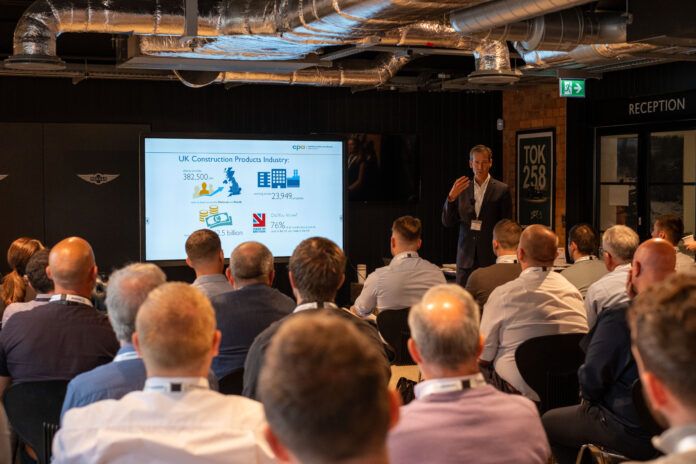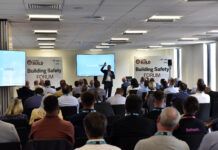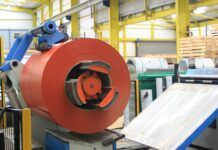
The first MCRMA Technical Conference in 18 years took place last week in the unique setting of the Morgan Motor Company’s factory and HQ in Worcestershire.
The new-format two-day members-only event included presentations and panel discussions covering the key issues affecting the metal building envelope sector, as well as highlighting the opportunities to succeed as the construction sector adopts the new building safety regime.
The event kicked-off with a welcome to the Morgan Motor Company factory by their Chief Quality Officer, Guy Williams, which led neatly onto a discussion about quality and standards with Steve Bramhill of UL International, a UKAS accredited testing laboratory and certification body. They discussed the challenges that both the automotive industry and construction face in respect of ensuring manufactured components are assembled to the correct standards, albeit in different environments, to achieve the performance specified in bespoke projects.
Session two looked at how to identify metal roofing defects. Presented by Phil Smith, an independent roofing inspector at PLS Surveys and David Carter of Liquasil, a manufacturer of silicone roof coatings and liquid gutter liners for industrial buildings, this session covered issues which were clearly very familiar to many of the conference delegates and offered recommendations on how they could address such problems.
The third presentation of the day came from Jeff May, Deputy Chief Executive of the Construction Products Association (CPA), who provided members with an update on the latest industry data and trends, and singled out labour availability as the biggest threat to growth in construction as a whole.
Day one wrapped up with a presentation by Barry Jackson and Nick Selves, who are two of the MCRMA’s longest standing members, and hosted a session entitled ‘Lessons in Systems Failures’, which talked through several real-world cases where the metal building envelope had not performed as intended.
On the second day of the MCRMA Technical Conference, members were able to take advantage of a timely panel discussion regarding the Building Safety Act and its competency requirements on the day that the Grenfell Inquiry phase 2 report was published. Chaired by one of the sector’s foremost advisors in this area, Gavin Hoccom, a partner at Browne Jacobson LLP, the session involved Natalia Thomas-Alvarez, technical competency manager at building control company Premier Guarantee, and Neville Grunwald, director of facades and roofing at Wates and the driving force behind the Joint Competence Initiative for the Envelope Sector (JCI), which he currently chairs.
A more technical session followed with a panel discussion about how to master fixings in the construction of metal building envelopes. This was hosted by the MCRMA’s director Carlton Jones and included representatives from four member companies who are leaders in the manufacture and supply of fasteners for the building envelope – EJOT UK, Fixfast, Fixing Point and SFS.
The Technical Conference concluded with a ‘What 3 questions?’ session hosted by the MCRMA’s Alan Markham. This explored equality, diversity and inclusion within the building envelope sector and provided an opportunity to delve deeper into issues relating to the industry’s new building safety regime. Neville Grunwald, Natalia Thomas-Alvarez and Gavin Hoccom returned for this discussion, joined by Dr Claire Griffiths, editor of Roofing Today magazine and Denise Cherry, Chair of the National Roof Training Group.
In addition to the technical sessions during both days, MCRMA members also enjoyed a networking dinner held on the evening of day one at the nearby Abbey Hotel in Great Malvern. It was here that the MCRMA’s awards presentation took place, with five awards presented to recognise those members who had gone the extra mile in helping to drive the metal building envelope sector forward.
Commenting on the event, Clare Fenton, Chair of the MCRMA, said: “Thank you to everyone who attended our first conference after an 18-year break. We were delighted with the interest and engagement shown across the MCRMA membership, which ultimately resulted in the event being at full capacity.
“Our goal was never for the event to be a series of lectures or simply an educational forum – we wanted to create a platform for open discussion about the ongoing challenges facing our industry. And thanks to the incredible wealth of knowledge in the room, not just from the speakers, we did more than spark conversation – we learned together.
“The MCRMA team is particularly grateful to our speakers, who were exceptional. We had the right voices at the right time, breaking down complex topics.”
She added: “We are hopeful, with the support of MCRMA members, that this marks the beginning of a new era for our Technical Conference and that it will become a staple in the industry calendar.”



